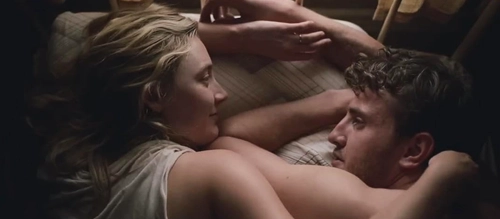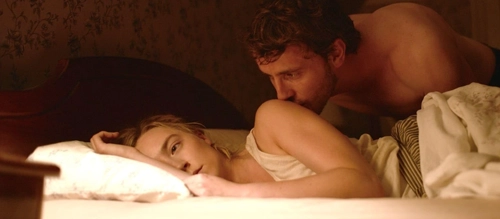Foe (2023) Review

Foe (2023)
Director: Garth Davis
Screenwriters: Garth Davis, Iain Reid
Starring: Paul Mescal, Saoirse Ronan, Aaron Pierre
Paul Mescal. Saoirse Ronan. An adaptation of a popular novel from the same author as “I’m Thinking of Ending Things”. Australian director Garth Davis’ latest is Foe, a film that could be described as a sci-fi, a psychological horror, and a relationship drama, all in equal parts. Conceptually, it has glimmers of a range of films including Marriage Story, Her, Passengers and at least three episodes of ‘Black Mirror’, but it doesn’t quite stick the landing.
Set in the near future, the year 2065 in the American midwest, we encounter a world in which climate change has effectively ravaged the Earth. The world is becoming more and more uninhabitable and, with AI replicas able to complete the mundane manual labour jobs, possibilities of moving humans to outer space is becoming an inevitable reality. This reality knocks on the door of unassuming young couple Hen (Saoirse Ronan) and Junior (Paul Mescal) one night in the form of government official Terrence (Aaron Pierre). Terrence sits the couple down and tells them that Junior has been shortlisted to go Off Earth for two years, and spend time living and working on a newly formed space station colony. Junior is repulsed by the idea, and particularly at the thought of leaving his wife. The news creates a shift in the relationship, but through their distance life goes on.
That is until Terrence returns a year later with Junior’s conscription papers – he is definitely leaving. But to placate the fear of leaving his wife alone, Terrence reassures Junior that she won’t be on her own. In fact, Terrence will be staying with the couple and conducting research on them and their marriage, so as to create a perfect AI replica of Junior.
What follows is a tense portrayal of a couple under a microscope, and a marriage that is clearly falling apart. There are moments of passion, and there is certainly a deep love and intimacy, but everything feels cold. It’s like somebody freezing a flame of what once was. The script often leaves room for the emotions to breathe, and it results in a restrained yet desperate portrayal of a man on the edge; this is not just the story of a couple’s relationship challenges, it is the story of a man’s fear of being replaced.
This restraint is extended to the visual landscape of the film. Australia functions as a stand-in for the American midwest, and the dust of the desert settles over this apocalyptic in-between: not quite a wasteland, definitely not a living, thriving home. The film often is shot through muted tones, under the cover of night, or lit only by the bright green headlights that mark Terrence’s coming and going. Park Jiha’s score only adds to the atmosphere: it’s eerie, it’s minimalist, it’s futuristic and naturalistic in shared measure.

But it’s in the space that is seemingly left in every facet of the film’s making that you can’t help but want something more. The pace is agonisingly slow, and while the mystery of the situation keeps you engaged and wanting to know more, often the film ties itself in circles, leaving you to wonder what’s going on. Its final act, in which the truth of the situation comes to light, is powerfully done, but the emotional weight of it feels nowhere near earned.
This is in no way down to the fault of Foe’s cast. Paul Mescal and Saoirse Ronan have established themselves as household names, and while the material of Foe isn’t quite enough to provoke star turns, they remain consistently good. Ronan displays the quiet dissatisfaction of Hen in an understated turn that feels like it should build to something, but never quite does. Maybe that’s the point – being in a marriage like hers has you constantly wondering if it’s ever going to get better, but life plods at its same pace. In contrast, Mescal’s Junior feels a lot angrier than Hen. Mescal brings some of the jagged edges he brought to his Olivier-winning turn on stage in “A Streetcar Named Desire”, but retains the grasp he has on emotional vulnerability: the factor that made him a stand-out in ‘Normal People‘. As the lingering, observing, presence, Aaron Pierre does a great job, holding authority with so much as a look.
Between there being such a small ensemble cast, a dialogue-heavy script, and an emotionally heavy relational core, it seems obvious that Foe would be a lot better as a play than it is as a film. The idea of feeling that tension tangibly in the air seems like a considerably better alternative to sitting and trying to absorb that turmoil through a screen, to little avail.
Foe could have been something special, but its clash of big, expansive ideas trying to be played out as subtle relationship drama, leaves something severely lacking in the in-between. It’s the type of film that can be appreciated in the moment, and leaves you thinking about it for a day or two, but other than one rewatch to try and see the foreshadowing hints of its conclusion, it’s hard to imagine this being a repeat watch for many.
Score: 13/24
Written by Rehana Nurmahi
You can support Rehana Nurmahi at the following links:
Twitter – @Han_notsolo
Letterboxd – hana_banana97
Portfolio – Authory

